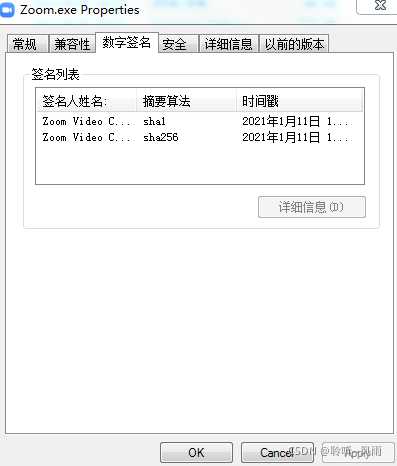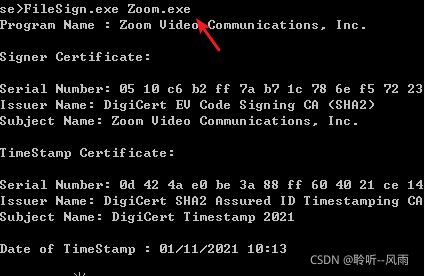现在许多应用都是有数字签名的。公司发布的程序一般也都需要签完名之后方可发布。
?
比如:
本文实现一个C++程序,用于获取指定文件的数字签名信息。运行结果如下:

代码如下:
#include <windows.h>
#include <wincrypt.h>
#include <wintrust.h>
#include <stdio.h>
#include <tchar.h>
#pragma comment(lib, "crypt32.lib")
#define ENCODING (X509_ASN_ENCODING | PKCS_7_ASN_ENCODING)
typedef struct {
LPWSTR lpszProgramName;
LPWSTR lpszPublisherLink;
LPWSTR lpszMoreInfoLink;
} SPROG_PUBLISHERINFO, *PSPROG_PUBLISHERINFO;
BOOL GetProgAndPublisherInfo(PCMSG_SIGNER_INFO pSignerInfo,
PSPROG_PUBLISHERINFO Info);
BOOL GetDateOfTimeStamp(PCMSG_SIGNER_INFO pSignerInfo, SYSTEMTIME *st);
BOOL PrintCertificateInfo(PCCERT_CONTEXT pCertContext);
BOOL GetTimeStampSignerInfo(PCMSG_SIGNER_INFO pSignerInfo,
PCMSG_SIGNER_INFO *pCounterSignerInfo);
int _tmain(int argc, TCHAR *argv[])
{
WCHAR szFileName[MAX_PATH];
HCERTSTORE hStore = NULL;
HCRYPTMSG hMsg = NULL;
PCCERT_CONTEXT pCertContext = NULL;
BOOL fResult;
DWORD dwEncoding, dwContentType, dwFormatType;
PCMSG_SIGNER_INFO pSignerInfo = NULL;
PCMSG_SIGNER_INFO pCounterSignerInfo = NULL;
DWORD dwSignerInfo;
CERT_INFO CertInfo;
SPROG_PUBLISHERINFO ProgPubInfo;
SYSTEMTIME st;
ZeroMemory(&ProgPubInfo, sizeof(ProgPubInfo));
__try
{
if (argc != 2)
{
_tprintf(_T("Usage: SignedFileInfo <filename>\n"));
return 0;
}
#ifdef UNICODE
lstrcpynW(szFileName, argv[1], MAX_PATH);
#else
if (mbstowcs(szFileName, argv[1], MAX_PATH) == -1)
{
printf("Unable to convert to unicode.\n");
__leave;
}
#endif
// Get message handle and store handle from the signed file.
fResult = CryptQueryObject(CERT_QUERY_OBJECT_FILE,
szFileName,
CERT_QUERY_CONTENT_FLAG_PKCS7_SIGNED_EMBED,
CERT_QUERY_FORMAT_FLAG_BINARY,
0,
&dwEncoding,
&dwContentType,
&dwFormatType,
&hStore,
&hMsg,
NULL);
if (!fResult)
{
_tprintf(_T("CryptQueryObject failed with %x\n"), GetLastError());
__leave;
}
// Get signer information size.
fResult = CryptMsgGetParam(hMsg,
CMSG_SIGNER_INFO_PARAM,
0,
NULL,
&dwSignerInfo);
if (!fResult)
{
_tprintf(_T("CryptMsgGetParam failed with %x\n"), GetLastError());
__leave;
}
// Allocate memory for signer information.
pSignerInfo = (PCMSG_SIGNER_INFO)LocalAlloc(LPTR, dwSignerInfo);
if (!pSignerInfo)
{
_tprintf(_T("Unable to allocate memory for Signer Info.\n"));
__leave;
}
// Get Signer Information.
fResult = CryptMsgGetParam(hMsg,
CMSG_SIGNER_INFO_PARAM,
0,
(PVOID)pSignerInfo,
&dwSignerInfo);
if (!fResult)
{
_tprintf(_T("CryptMsgGetParam failed with %x\n"), GetLastError());
__leave;
}
// Get program name and publisher information from
// signer info structure.
if (GetProgAndPublisherInfo(pSignerInfo, &ProgPubInfo))
{
if (ProgPubInfo.lpszProgramName != NULL)
{
wprintf(L"Program Name : %s\n",
ProgPubInfo.lpszProgramName);
}
if (ProgPubInfo.lpszPublisherLink != NULL)
{
wprintf(L"Publisher Link : %s\n",
ProgPubInfo.lpszPublisherLink);
}
if (ProgPubInfo.lpszMoreInfoLink != NULL)
{
wprintf(L"MoreInfo Link : %s\n",
ProgPubInfo.lpszMoreInfoLink);
}
}
_tprintf(_T("\n"));
// Search for the signer certificate in the temporary
// certificate store.
CertInfo.Issuer = pSignerInfo->Issuer;
CertInfo.SerialNumber = pSignerInfo->SerialNumber;
pCertContext = CertFindCertificateInStore(hStore,
ENCODING,
0,
CERT_FIND_SUBJECT_CERT,
(PVOID)&CertInfo,
NULL);
if (!pCertContext)
{
_tprintf(_T("CertFindCertificateInStore failed with %x\n"),
GetLastError());
__leave;
}
// Print Signer certificate information.
_tprintf(_T("Signer Certificate:\n\n"));
PrintCertificateInfo(pCertContext);
_tprintf(_T("\n"));
// Get the timestamp certificate signerinfo structure.
if (GetTimeStampSignerInfo(pSignerInfo, &pCounterSignerInfo))
{
// Search for Timestamp certificate in the temporary
// certificate store.
CertInfo.Issuer = pCounterSignerInfo->Issuer;
CertInfo.SerialNumber = pCounterSignerInfo->SerialNumber;
pCertContext = CertFindCertificateInStore(hStore,
ENCODING,
0,
CERT_FIND_SUBJECT_CERT,
(PVOID)&CertInfo,
NULL);
if (!pCertContext)
{
_tprintf(_T("CertFindCertificateInStore failed with %x\n"),
GetLastError());
__leave;
}
// Print timestamp certificate information.
_tprintf(_T("TimeStamp Certificate:\n\n"));
PrintCertificateInfo(pCertContext);
_tprintf(_T("\n"));
// Find Date of timestamp.
if (GetDateOfTimeStamp(pCounterSignerInfo, &st))
{
_tprintf(_T("Date of TimeStamp : %02d/%02d/%04d %02d:%02d\n"),
st.wMonth,
st.wDay,
st.wYear,
st.wHour,
st.wMinute);
}
_tprintf(_T("\n"));
}
}
__finally
{
// Clean up.
if (ProgPubInfo.lpszProgramName != NULL)
LocalFree(ProgPubInfo.lpszProgramName);
if (ProgPubInfo.lpszPublisherLink != NULL)
LocalFree(ProgPubInfo.lpszPublisherLink);
if (ProgPubInfo.lpszMoreInfoLink != NULL)
LocalFree(ProgPubInfo.lpszMoreInfoLink);
if (pSignerInfo != NULL) LocalFree(pSignerInfo);
if (pCounterSignerInfo != NULL) LocalFree(pCounterSignerInfo);
if (pCertContext != NULL) CertFreeCertificateContext(pCertContext);
if (hStore != NULL) CertCloseStore(hStore, 0);
if (hMsg != NULL) CryptMsgClose(hMsg);
}
return 0;
}
BOOL PrintCertificateInfo(PCCERT_CONTEXT pCertContext)
{
BOOL fReturn = FALSE;
LPTSTR szName = NULL;
DWORD dwData;
__try
{
// Print Serial Number.
_tprintf(_T("Serial Number: "));
dwData = pCertContext->pCertInfo->SerialNumber.cbData;
for (DWORD n = 0; n < dwData; n++)
{
_tprintf(_T("%02x "),
pCertContext->pCertInfo->SerialNumber.pbData[dwData - (n + 1)]);
}
_tprintf(_T("\n"));
// Get Issuer name size.
if (!(dwData = CertGetNameString(pCertContext,
CERT_NAME_SIMPLE_DISPLAY_TYPE,
CERT_NAME_ISSUER_FLAG,
NULL,
NULL,
0)))
{
_tprintf(_T("CertGetNameString failed.\n"));
__leave;
}
// Allocate memory for Issuer name.
szName = (LPTSTR)LocalAlloc(LPTR, dwData * sizeof(TCHAR));
if (!szName)
{
_tprintf(_T("Unable to allocate memory for issuer name.\n"));
__leave;
}
// Get Issuer name.
if (!(CertGetNameString(pCertContext,
CERT_NAME_SIMPLE_DISPLAY_TYPE,
CERT_NAME_ISSUER_FLAG,
NULL,
szName,
dwData)))
{
_tprintf(_T("CertGetNameString failed.\n"));
__leave;
}
// print Issuer name.
_tprintf(_T("Issuer Name: %s\n"), szName);
LocalFree(szName);
szName = NULL;
// Get Subject name size.
if (!(dwData = CertGetNameString(pCertContext,
CERT_NAME_SIMPLE_DISPLAY_TYPE,
0,
NULL,
NULL,
0)))
{
_tprintf(_T("CertGetNameString failed.\n"));
__leave;
}
// Allocate memory for subject name.
szName = (LPTSTR)LocalAlloc(LPTR, dwData * sizeof(TCHAR));
if (!szName)
{
_tprintf(_T("Unable to allocate memory for subject name.\n"));
__leave;
}
// Get subject name.
if (!(CertGetNameString(pCertContext,
CERT_NAME_SIMPLE_DISPLAY_TYPE,
0,
NULL,
szName,
dwData)))
{
_tprintf(_T("CertGetNameString failed.\n"));
__leave;
}
// Print Subject Name.
_tprintf(_T("Subject Name: %s\n"), szName);
fReturn = TRUE;
}
__finally
{
if (szName != NULL) LocalFree(szName);
}
return fReturn;
}
LPWSTR AllocateAndCopyWideString(LPCWSTR inputString)
{
LPWSTR outputString = NULL;
outputString = (LPWSTR)LocalAlloc(LPTR,
(wcslen(inputString) + 1) * sizeof(WCHAR));
if (outputString != NULL)
{
lstrcpyW(outputString, inputString);
}
return outputString;
}
BOOL GetProgAndPublisherInfo(PCMSG_SIGNER_INFO pSignerInfo,
PSPROG_PUBLISHERINFO Info)
{
BOOL fReturn = FALSE;
PSPC_SP_OPUS_INFO OpusInfo = NULL;
DWORD dwData;
BOOL fResult;
__try
{
// Loop through authenticated attributes and find
// SPC_SP_OPUS_INFO_OBJID OID.
for (DWORD n = 0; n < pSignerInfo->AuthAttrs.cAttr; n++)
{
if (lstrcmpA(SPC_SP_OPUS_INFO_OBJID,
pSignerInfo->AuthAttrs.rgAttr[n].pszObjId) == 0)
{
// Get Size of SPC_SP_OPUS_INFO structure.
fResult = CryptDecodeObject(ENCODING,
SPC_SP_OPUS_INFO_OBJID,
pSignerInfo->AuthAttrs.rgAttr[n].rgValue[0].pbData,
pSignerInfo->AuthAttrs.rgAttr[n].rgValue[0].cbData,
0,
NULL,
&dwData);
if (!fResult)
{
_tprintf(_T("CryptDecodeObject failed with %x\n"),
GetLastError());
__leave;
}
// Allocate memory for SPC_SP_OPUS_INFO structure.
OpusInfo = (PSPC_SP_OPUS_INFO)LocalAlloc(LPTR, dwData);
if (!OpusInfo)
{
_tprintf(_T("Unable to allocate memory for Publisher Info.\n"));
__leave;
}
// Decode and get SPC_SP_OPUS_INFO structure.
fResult = CryptDecodeObject(ENCODING,
SPC_SP_OPUS_INFO_OBJID,
pSignerInfo->AuthAttrs.rgAttr[n].rgValue[0].pbData,
pSignerInfo->AuthAttrs.rgAttr[n].rgValue[0].cbData,
0,
OpusInfo,
&dwData);
if (!fResult)
{
_tprintf(_T("CryptDecodeObject failed with %x\n"),
GetLastError());
__leave;
}
// Fill in Program Name if present.
if (OpusInfo->pwszProgramName)
{
Info->lpszProgramName =
AllocateAndCopyWideString(OpusInfo->pwszProgramName);
}
else
Info->lpszProgramName = NULL;
// Fill in Publisher Information if present.
if (OpusInfo->pPublisherInfo)
{
switch (OpusInfo->pPublisherInfo->dwLinkChoice)
{
case SPC_URL_LINK_CHOICE:
Info->lpszPublisherLink =
AllocateAndCopyWideString(OpusInfo->pPublisherInfo->pwszUrl);
break;
case SPC_FILE_LINK_CHOICE:
Info->lpszPublisherLink =
AllocateAndCopyWideString(OpusInfo->pPublisherInfo->pwszFile);
break;
default:
Info->lpszPublisherLink = NULL;
break;
}
}
else
{
Info->lpszPublisherLink = NULL;
}
// Fill in More Info if present.
if (OpusInfo->pMoreInfo)
{
switch (OpusInfo->pMoreInfo->dwLinkChoice)
{
case SPC_URL_LINK_CHOICE:
Info->lpszMoreInfoLink =
AllocateAndCopyWideString(OpusInfo->pMoreInfo->pwszUrl);
break;
case SPC_FILE_LINK_CHOICE:
Info->lpszMoreInfoLink =
AllocateAndCopyWideString(OpusInfo->pMoreInfo->pwszFile);
break;
default:
Info->lpszMoreInfoLink = NULL;
break;
}
}
else
{
Info->lpszMoreInfoLink = NULL;
}
fReturn = TRUE;
break; // Break from for loop.
} // lstrcmp SPC_SP_OPUS_INFO_OBJID
} // for
}
__finally
{
if (OpusInfo != NULL) LocalFree(OpusInfo);
}
return fReturn;
}
BOOL GetDateOfTimeStamp(PCMSG_SIGNER_INFO pSignerInfo, SYSTEMTIME *st)
{
BOOL fResult;
FILETIME lft, ft;
DWORD dwData;
BOOL fReturn = FALSE;
// Loop through authenticated attributes and find
// szOID_RSA_signingTime OID.
for (DWORD n = 0; n < pSignerInfo->AuthAttrs.cAttr; n++)
{
if (lstrcmpA(szOID_RSA_signingTime,
pSignerInfo->AuthAttrs.rgAttr[n].pszObjId) == 0)
{
// Decode and get FILETIME structure.
dwData = sizeof(ft);
fResult = CryptDecodeObject(ENCODING,
szOID_RSA_signingTime,
pSignerInfo->AuthAttrs.rgAttr[n].rgValue[0].pbData,
pSignerInfo->AuthAttrs.rgAttr[n].rgValue[0].cbData,
0,
(PVOID)&ft,
&dwData);
if (!fResult)
{
_tprintf(_T("CryptDecodeObject failed with %x\n"),
GetLastError());
break;
}
// Convert to local time.
FileTimeToLocalFileTime(&ft, &lft);
FileTimeToSystemTime(&lft, st);
fReturn = TRUE;
break; // Break from for loop.
} //lstrcmp szOID_RSA_signingTime
} // for
return fReturn;
}
BOOL GetTimeStampSignerInfo(PCMSG_SIGNER_INFO pSignerInfo, PCMSG_SIGNER_INFO *pCounterSignerInfo)
{
PCCERT_CONTEXT pCertContext = NULL;
BOOL fReturn = FALSE;
BOOL fResult;
DWORD dwSize;
__try
{
*pCounterSignerInfo = NULL;
// Loop through unathenticated attributes for
// szOID_RSA_counterSign OID.
for (DWORD n = 0; n < pSignerInfo->UnauthAttrs.cAttr; n++)
{
if (lstrcmpA(pSignerInfo->UnauthAttrs.rgAttr[n].pszObjId,
szOID_RSA_counterSign) == 0)
{
// Get size of CMSG_SIGNER_INFO structure.
fResult = CryptDecodeObject(ENCODING,
PKCS7_SIGNER_INFO,
pSignerInfo->UnauthAttrs.rgAttr[n].rgValue[0].pbData,
pSignerInfo->UnauthAttrs.rgAttr[n].rgValue[0].cbData,
0,
NULL,
&dwSize);
if (!fResult)
{
_tprintf(_T("CryptDecodeObject failed with %x\n"),
GetLastError());
__leave;
}
// Allocate memory for CMSG_SIGNER_INFO.
*pCounterSignerInfo = (PCMSG_SIGNER_INFO)LocalAlloc(LPTR, dwSize);
if (!*pCounterSignerInfo)
{
_tprintf(_T("Unable to allocate memory for timestamp info.\n"));
__leave;
}
// Decode and get CMSG_SIGNER_INFO structure
// for timestamp certificate.
fResult = CryptDecodeObject(ENCODING,
PKCS7_SIGNER_INFO,
pSignerInfo->UnauthAttrs.rgAttr[n].rgValue[0].pbData,
pSignerInfo->UnauthAttrs.rgAttr[n].rgValue[0].cbData,
0,
(PVOID)*pCounterSignerInfo,
&dwSize);
if (!fResult)
{
_tprintf(_T("CryptDecodeObject failed with %x\n"),
GetLastError());
__leave;
}
fReturn = TRUE;
break; // Break from for loop.
}
}
}
__finally
{
// Clean up.
if (pCertContext != NULL) CertFreeCertificateContext(pCertContext);
}
return fReturn;
}